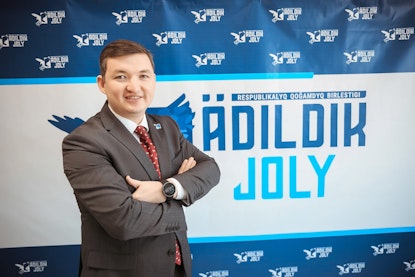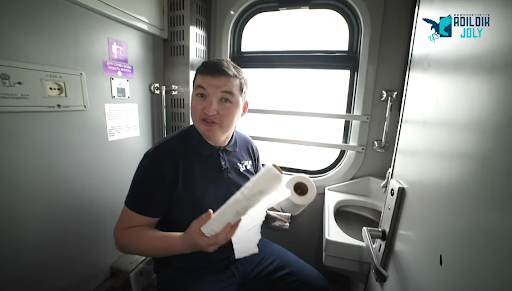Meet the Kazakh corruption watchers cleaning up procurement

Of all the places you might expect to find corruption hiding, a train restroom probably isn’t one of them. But that’s what happened to Adildik Zholy, a civil society organization in Kazakhstan that looks for evidence of rule-breaking in the country’s US$14 billion public procurement market and shares their discoveries with government regulators.
In 2022, the group received a tip-off that the country’s largest state-owned railway company had been purchasing toilet paper for the last 4 years at inflated prices. The overall costs exceeded over 1.4 billion tenge (almost US$2.9 million). The estimated losses totaled 465 million tenge (US$1 million).
This is just one of 310 cases over a period of eight months in which Adildik Zholy uncovered legal violations in contracting procedures. As a result of these probes, authorities have issued fines of more than 67 million tenge (US$150,000) and opened 21 criminal cases.
Fully operational since October 2021, the NGO’s rapid success demonstrates how powerful an asset civil society could be for Kazakhstan’s government in tackling the many challenges facing the public procurement sector, which include low competition, poor transparency, and inefficient spending, according to experts at the World Bank.
While Adildik Zholy often relies on searching the government’s open procurement database, the group’s approach to monitoring isn’t limited to simply documenting suspicious details in contracting records. It also includes field trips, conducting measurements and different evaluations, talking to technical experts, and helping document evidence that a contractor has underperformed or of violations in executing contracts to prove funds have been embezzled.
Their investigation of the toilet paper scheme is a good illustration of how this approach works. The contracts of the railway service Kazakhstan Temir Zholy are still drawn up on paper. This means they aren’t available for public scrutiny on the government procurement website, so the monitoring team’s initial lead in this case came from a human source. It turned out the state-owned company had been using the same supplier for five years to buy items like toilet paper, paper toilet, and disposable seat covers at inflated prices.

But how did they prove the prices were inflated? Adildik Zholy hired an independent expert from the Institute of Forensic Expertise. Posing as potential buyers, they approached the same supplier who provided the products to the railways, and asked for a quote for the exact same toilet paper. They discovered the firm was eager to make them a much better offer than to Kazakhstan Temir Zholy. Even adjusting for the fact the deals first took place six years ago, the price set for Adildik was notably cheaper. It took them six months to research the case before handing it over to the regulatory authorities.
Early setbacks and adjustments
Adildik Zhoy’s monitoring efforts haven’t always gone as smoothly as in that case. In the beginning, the team’s process looked like this: identify violations, notify journalists and get reports published about them in the media, document these cases and send them to oversight institutions and wait for an outcome. Unfortunately, this didn’t produce the desired results. The first cases fell apart at the stage of the law enforcement agencies’ investigation, despite the compelling evidence provided and some vocal public campaigning, explains the organization’s Executive Director Didar Smagulov. For example, in the city of Kosshy, they revealed a theft involving over 25 million tenge ($55,000).
“Of course, we can’t blame anyone without a court decision, but it’s hard to imagine that everything that happened is out of sight of the akim [the head of the local government],” says Didar. “We reported this case to the law enforcement agency. Unfortunately, we cannot interfere in their activities, in terms of the criminal process,” he adds. As a result of the investigation, the accountant was reprimanded, the akim resigned, and Adildik Zhory were told it was impossible to bring him to justice. “We were not satisfied with this result.»
It can also be very difficult to get cases registered for pre-trial investigations. To initiate a corruption case, the Anti-Corruption Agency needs the opinion of the Internal Audit Committee. No matter how obvious the legal violation or theft is, the anti-corruption unit will not do anything without this committee’s conclusions.
For eight months we wrote appeals about the violations to the procurement law. They paid attention to us, because we didn’t just write, we also called, asked, and followed up until we saw an announcement about an administrative offense or the case was transferred to law enforcement agencies
His team methodically monitors the ‘fate’ of all appeals. In recent months, his colleagues in different regions complained that the Internal Audit Agency began to refuse to accept their letters, referring to the Public Procurement Law arguing that civil society organizations are not participants in the public procurement process.
“The law says that one of the parties [in the deal] can appeal against the decision on public procurement. But we insisted on our right to appeal to regulatory authorities based on the State Audit Law and insisted on initiating inquiries based on appeals from individuals and legal entities. The President of Kazakhstan mentioned a need to strengthen civic oversight, and the Anti-Corruption Agency (Anticor) talks about the need to involve citizens in the fight against corruption,” explains Didar.
Based on Adildik Zholy appeals, 310 administrative protocols (official memos) were drawn up over the last eight months in relation to various heads of akimats (local governments) and other officials. This led to those involved paying fines totaling 67,858,086 tenge (more than US$150,000). “But most importantly, they know they are being watched, not only by the authorized state bodies but also by independent public organizations.”
The most common questions the NGO hears from civil servants are: who is backing you? Who hired you? “We declare that we’re backed by the people of Kazakhstan and the law, which allows public oversight,” Didar says.
As a result of their appeals, 21 criminal cases have been initiated against various officials who were suspected of embezzling budget funds and abuse of power. Representatives of Adildik Zholy are now actively involved in these cases as experts. They provide most of the evidence underpinning the case, to the extent that they travel with the prosecutor’s office to the regions and observe everything on the ground. Kazakh legislation allows independent experts to involve representatives of NGOs. Thanks to the attention of the CSOs such cases are not allowed to “fall apart” during the prosecution process.
Entrepreneurial ventures
The team actively cooperates with business representatives too. On one occasion, a lawyer from a company that won a contract to supply cars for the State Archive asked Adildik Zholy for help with a situation where officials did not accept the cars offered and demanded more luxurious vehicles than indicated in the contract specification.
“We took this case for investigation and published our findings. But after the investigation, we managed to establish a direct communication channel between the company and the head of the State Archive to facilitate dialogue and resolve the conflict,” says Didar.
The private sector is also willing to contribute to anti-corruption activities. Adildik Zholy partnered with Datanomix, a company that specializes in creating data analytics tools for in-depth risk analysis in public procurement. Datanomix agreed to share some of their approaches for identifying risks, which helped Adildik Zholy to decide which cases were most vulnerable to corruption and take them on.
“Our approach is to detect procurement procedures that have been announced by government agencies using non-competitive procurement methods for “competitive goods” – goods that other buyers buy in a competitive environment. And we offer the buyers to transfer such purchases to a competitive method, to ensure fair prices are achieved at the auction and generate savings. We have focused our attention on prevention – on the stages when the waste of public funds can still be deterred.”
For now, public procurement monitoring is Adildik Zholy’s main priority, but the team also cooperates with government agencies to develop legislative and policy reforms, and gives free legal aid to citizens who face problems when dealing with government bodies, particularly clients from rural areas and marginalized groups.
From civil servant to civic trailblazer
Adildik Zholy may only be in its infancy, but its executive director has an impressive track-record of curbing wasteful spending during the five years he worked as a civil servant. Didar had roles in several anti-corruption offices and in the education sector eliminating bribery in university admissions. He created Adildik Zholy in May 2021 after seeing an opportunity to improve the allocation of public funds and the quality of public services from outside the system.
Among the organization’s plans for the future, Didar hopes to run free online master classes on how to monitor public procurement to encourage an even larger number of motivated specialists to take up the challenge of minimizing the abuse of public funds and changing the procurement market for the better.
A huge motivation for me is the fact that I want to live in this country, I want my children to live here. I want them to study in good schools, I want them to receive good quality medical care. I connect my life with Kazakhstan and I understand that if we don’t take care of this, then no one will do it.
This is an abridged version of a story translated from Russian. Read the original here.